Most breeds of goats have horns naturally.
Many goat owners remove the horns with a dehorning iron while they are young.
Goats without horns pose less risk of injuries to themselves, the rest of the herd, and the people around them.
If you are looking for goat breeds without horns, check out these 8 awesome options.
Table of Contents
ToggleNigerian Dwarf Goats
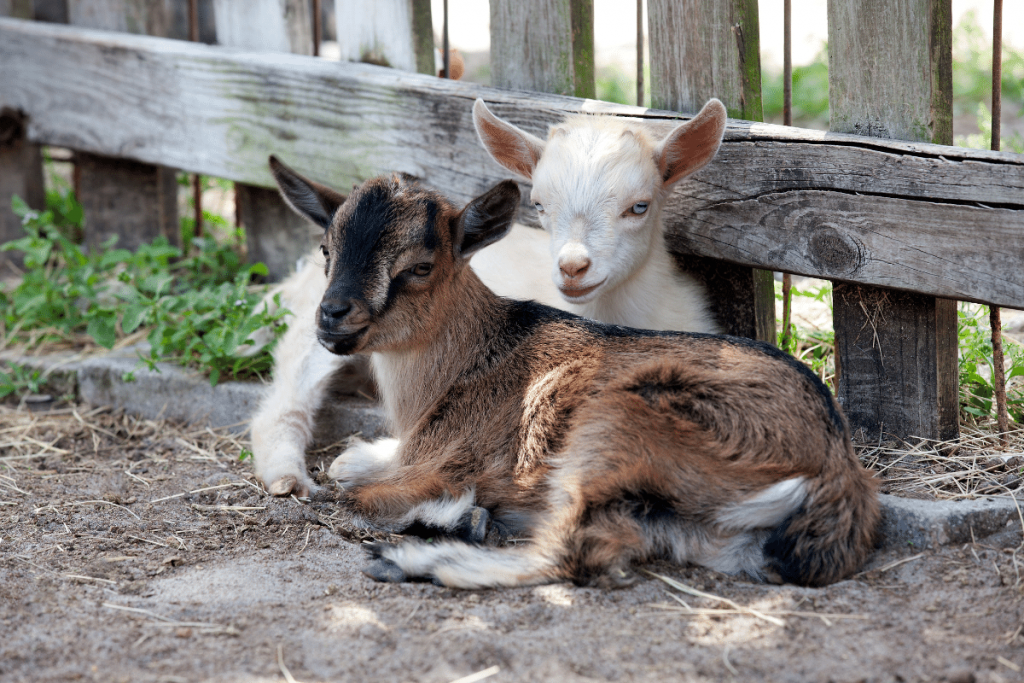
If you have a horned goat in your herd, you may be interested in finding a breed without them.
The Nigerian Dwarf goat has the genetics for polled horns.
Polls are significantly smaller and more rounded than standard horns.
Nigerian Dwarves also make an excellent dairy breed for their high butterfat content.
The high-fat content in milk makes it much more creamy and delicious.
Nubian Goats
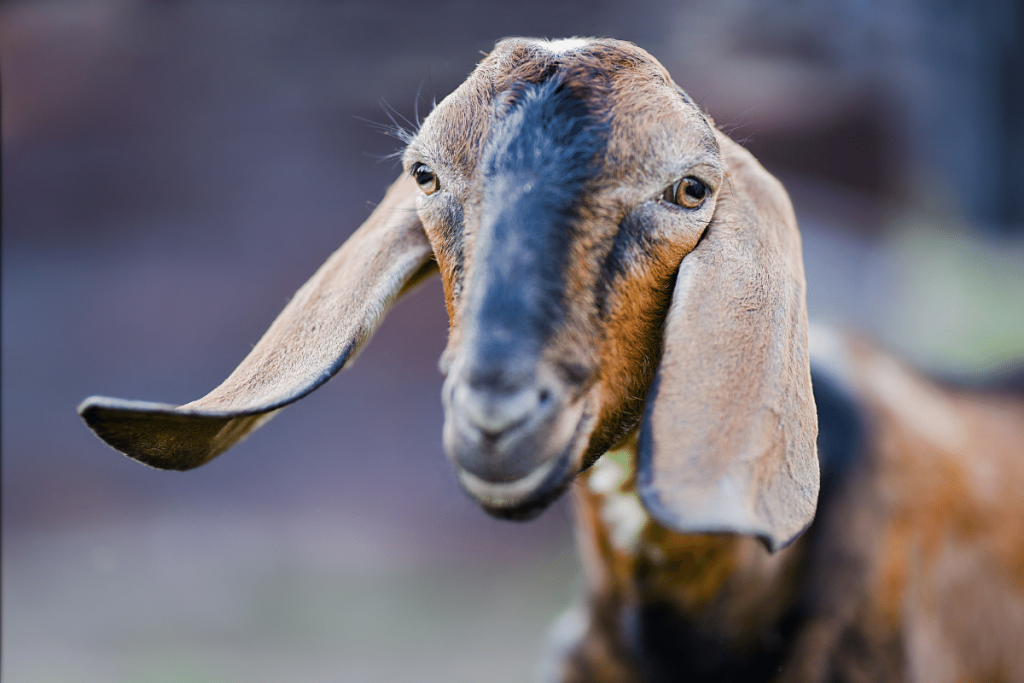
The Nubian breed of goat is another one carrying the polled gene.
This breed of goat is one of the most widely used for dairy.
Many Nubians also have horns, but goat breeders are increasingly only breeding polled Nubians, so the number of hornless Nubian goats is bound to increase.
La Mancha Breed
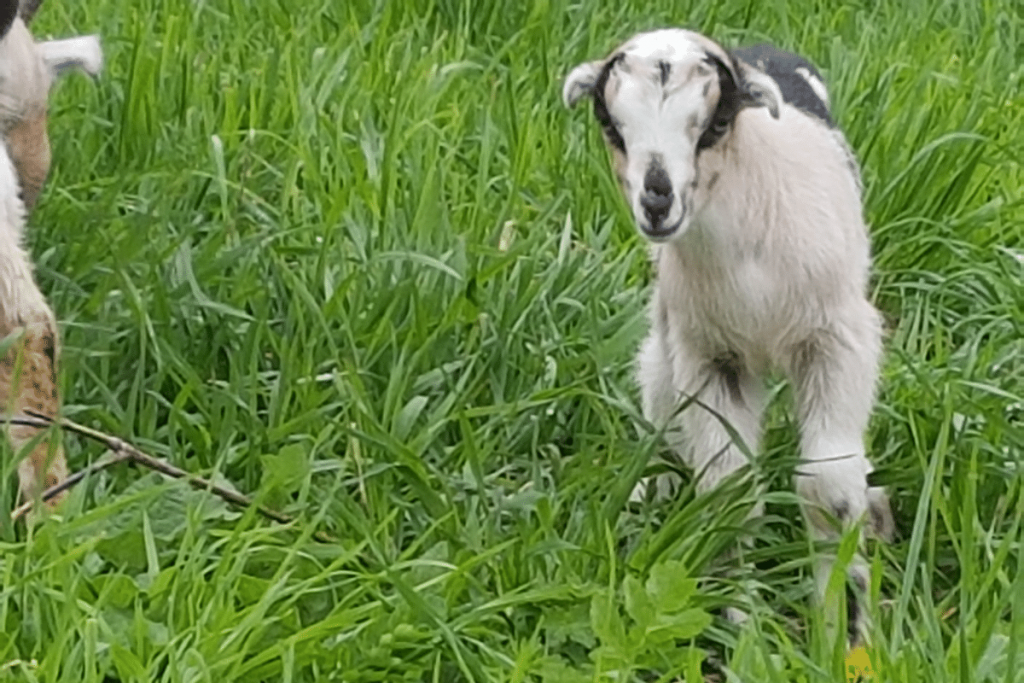
LaMancha goats are another breed selectively bred to produce the polled genes.
It is very common for goats of the LaMancha breed not to have horns.
Despite the name, the LaMancha is not a Spanish goat.
They were predominantly bred in the United States.
This breed makes excellent dairy goats and is celebrated for the high butterfat content in their milk.
They come in various colors, including brown, tan, mixed, and white hair.
Alpine Goats
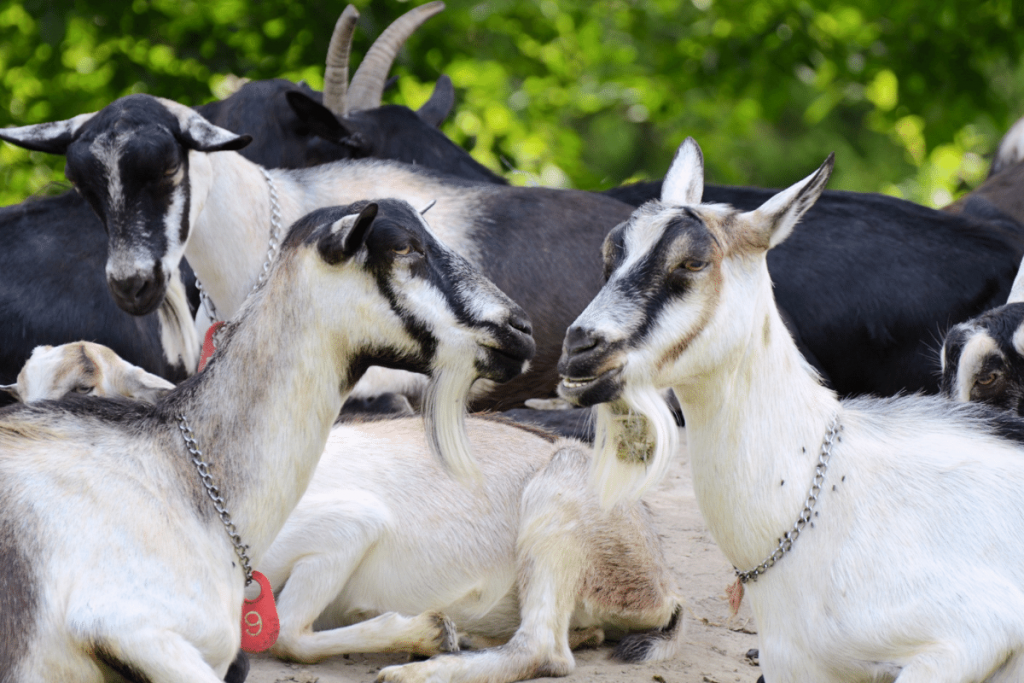
Some Alpines have goat horns, but many are bred to carry the polled gene.
The polled gene is much more common in the British Alpine compared to the French Alpine.
The Alpines were bred from Nubian and Toggenburg goats in the Swiss Alps.
Alpines are often kept for their prolific milk production.
Miniature Oberhasli
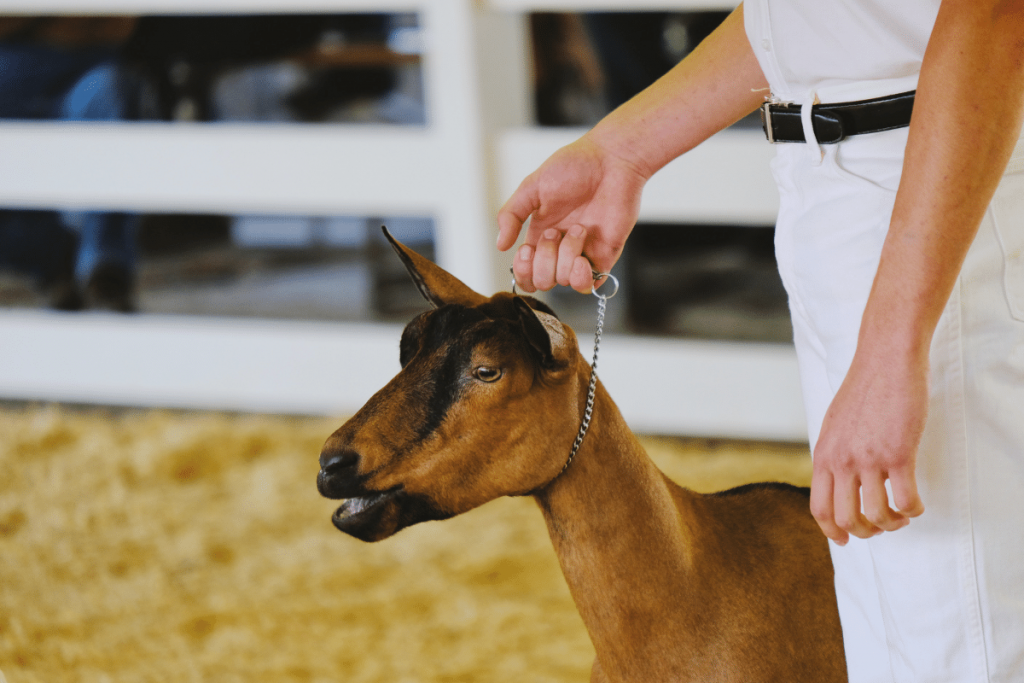
For those not interested in building a herd with larger breeds, the Miniature Oberhasli is a great option.
Many Miniature Oberhasli goats do not have horns, but this depends on their region.
Due to their small size, they are excellent for small properties and urban settings.
Despite their tiny stature, the Miniature Oberhasli goat still produces an impressive 1 1/2 gallons of milk daily.
This is more milk per day than the larger Alpine dairy goat breed.
Related: How much milk does a goat make per day?
Toggenburg Goats
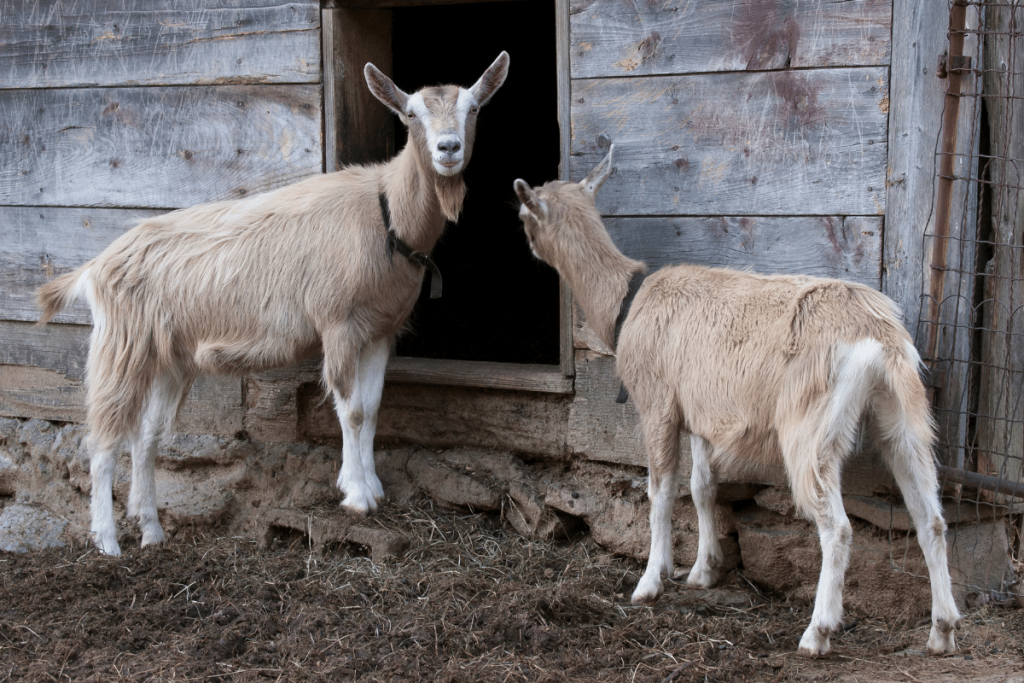
Toggenburg goats are another hornless goat breed.
This is one of the most common goat breeds without horns.
They have a friendly nature and are generally considered to be docile goats.
This friendly goat is very hardy and thrives in cold temperatures.
The Toggenburg breed goat is generally recognized as the oldest breed of dairy goat.
Pygmy Goats
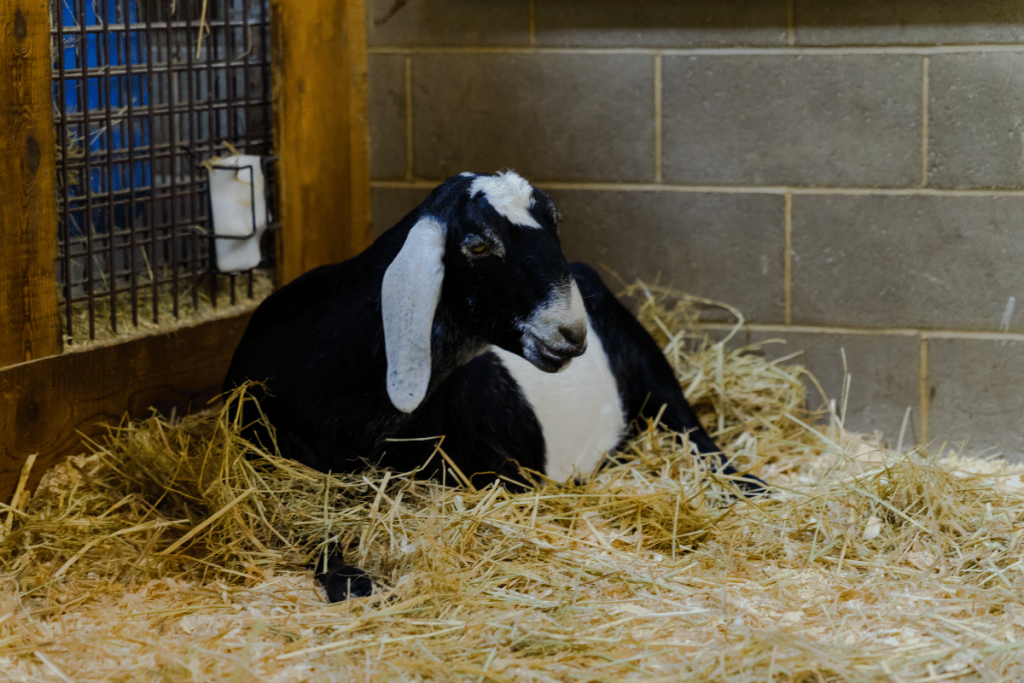
Pygmy goats are a famous domestic goat breed.
Dairy goat owners love their small size.
Adult pygmy goats reach an average weight of 154 lbs for males and 121 lbs for female goats.
The Pygmy goat carries the gene for polls, but not all of them are hornless.
Many goat owners cut the horn bud just as it forms to achieve hornless pygmy goats.
This beautiful goat is one of the most common goat breeds for those with limited space.
Saanen Goats
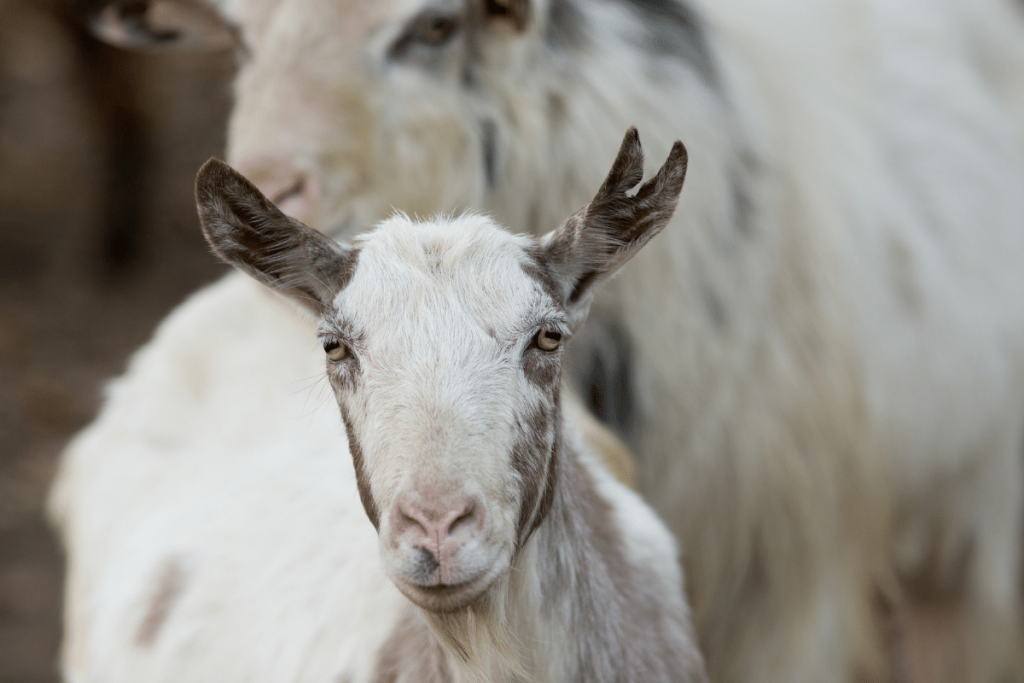
Saanen goats carry the polled gene, and many do not have horns.
They have a much larger weight than most of the common goat breeds.
They are heavy milk producers and are kept for both modest and prolific dairy production.
Many Saanens have horns, but it is possible to find ones without horns.
In addition to polls, Saanens typically have wattles or fleshy appendages on their necks.
Related: 8 Goats That Have Wattles
Myotonic Breed
Myotonic goats are commonly known as fainting goats.
They carry a genetic disorder called Myotonia Congenita.
This disorder causes the goat to stiffen up and faint when startled.
Myotonic goats are usually polled, but some have horns as well.
These goats are typically kept for pets and the protection of herd animals, but some also keep them for their meat production.
They are not the most efficient meat goats and typically are better suited for pets.
Further reading: Why do goats scream and faint?
Why Don’t Some Breeds Of Goats Have Horns?
Most of the time, when we see meat goats or dairy goats on a farm, they do not have horns.
However, wild goats naturally grow horns.
There are some breeds of goats without horns.
These types of goats typically have polls instead of horns.
Polled goats don’t have horns.
Instead, they usually have small nubs where their horns would be.
Some breeds naturally carry this gene, and many goat breeders will isolate this gene to achieve naturally hornless goats.
Why Do People Dehorn Their Goats?
There is some debate among goat owners about whether or not to keep the horns on their goats.
Many will burn the horns off with a dehorning iron like this when they are very young to keep the horns from ever developing.
The process involves heating the iron and putting it around the horn bud as it begins to develop.
The iron burn kills the horn and allows the goat keeper to essentially pop it off.
This process takes a few days to heal, but after it is finished, the goat will no longer grow horns.
You may wonder why anyone would want to do this, but there are quite a few benefits to taking the horns of your goats.
Protects Goats From Hurting Themselves
Sometimes goats get feisty and playful.
Their energetic outbursts sometimes get caught in fences and other things.
When this happens, they often struggle to break free and injure themselves.
This is a serious concern and is easily avoided by removing the horns.
Keeps Goat Fights From Getting Bloody
Goats, especially maturing males, will get into spats now and then.
We hate to see it happen, but it is something to consider.
If goats don’t have horns, the chance of injury is significantly less during fights.
Getting polled goats or dehorning them helps drastically decrease the risk of the herd seriously injuring each other.
Protects Goat Owners From Getting Hurt
Some goats are not as friendly or easy to manage as others.
Often when a goat gets upset with its owner, it will headbutt them.
Getting headbutted by a goat with horns hurts a lot more than getting hit by one without horns.
This is another reason to dehorn your goats or get a herd with polls.
How useful was this post?
Click on a star to rate it!
We are sorry that this post was not useful for you!
Let us improve this post!
Tell us how we can improve this post?
